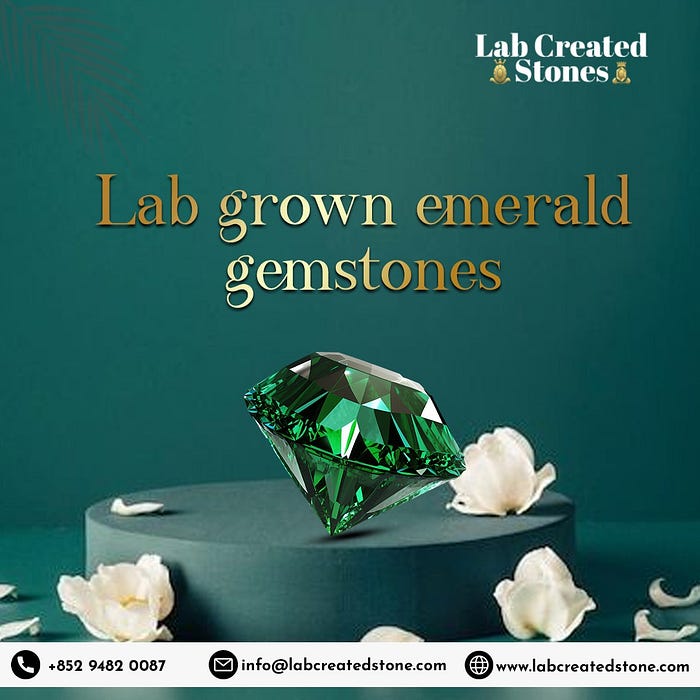Emeralds have long been cherished
for their vibrant green hues and timeless beauty. However, with the rise of
technology in gemstone creation, lab-grown emeralds are now becoming a popular
and more accessible alternative to their natural counterparts. While
traditional emeralds hold historical and cultural significance, lab-grown
emeralds offer several advantages that make them an attractive investment. In
this article, we’ll explore the key benefits of investing in lab-grown emerald
gemstones and why they’re worth considering for jewelry or as part of a
gemstone collection.
1.
Affordable Luxury
One of the most notable benefits of
lab-grown emeralds is their affordability. Natural emeralds are rare,
especially those of higher quality, and their scarcity drives up the price. In
contrast, lab-grown emeralds are created in controlled environments, which
allows for more efficient production. This process significantly reduces the
cost, making lab-grown emeralds a more budget-friendly option without
sacrificing the stunning appearance that emeralds are known for.
For anyone looking to invest in gemstones,
the lower cost of lab grown emeralds
provides an opportunity to acquire larger or higher-grade stones at a fraction
of the price of natural emeralds. This means you can enjoy the beauty of a
vivid, flawless emerald without breaking the bank.
2.
Ethical and Environmentally Friendly
Another major advantage of lab-grown
emeralds is that they are ethically sourced and environmentally friendly.
Mining natural emeralds often involves harmful practices, including
deforestation, soil degradation, and water pollution. Additionally, in some
regions, gemstone mining can be linked to unsafe working conditions and
exploitation of workers.
In contrast, lab-grown emeralds are
produced in a controlled laboratory environment, eliminating the need for
destructive mining practices. This eco-friendly approach makes lab-created
emeralds an excellent option for consumers who prioritize sustainability and
ethical sourcing. By investing in lab-grown emeralds, you can enjoy the peace
of mind that comes from knowing your gemstone did not contribute to
environmental harm or human exploitation.
3.
Superior Clarity and Quality
Lab-grown emeralds are often of
higher clarity than their natural counterparts. In nature, emeralds are formed
under intense heat and pressure, which can result in internal flaws, known as
inclusions. These inclusions can affect the gemstone’s transparency and overall
aesthetic appeal. While natural emeralds with fewer inclusions are highly
prized, they are also exceedingly rare and expensive.
Lab-created emeralds, on the other
hand, are produced using advanced techniques that allow for greater control
over the growth process. As a result, they tend to have fewer inclusions, leading
to better clarity and a more consistent, brilliant appearance. This makes
lab-grown emeralds an attractive choice for those seeking a flawless gemstone
for investment or personal use.
4.
Availability in Larger Sizes
Due to the controlled nature of lab
production, it is easier to produce larger emerald gemstones. Natural emeralds,
especially those with desirable color and clarity, are challenging to find in
larger sizes, and the price increases exponentially with carat weight. With
lab-grown emeralds, it’s possible to invest in a larger stone without paying
exorbitant prices.
Larger emeralds are often seen as
more valuable and make a bold statement in jewelry designs. Whether you’re
looking for an eye-catching emerald ring or pendant, lab-grown emeralds offer
the opportunity to purchase bigger stones, allowing you to create pieces that
stand out while remaining within your budget.
5.
Chemically and Physically Identical to Natural Emeralds
One of the most fascinating aspects
of lab grown emerald
gemstones is that they are virtually identical to natural emeralds in
terms of chemical composition and physical properties. Both types of emeralds
are made from the mineral beryl and obtain their green color from trace amounts
of chromium and vanadium. The only difference lies in the way they are
formed—naturally occurring emeralds are formed deep within the Earth, while
lab-grown emeralds are created using technology that mimics the natural growth
process.
Because lab-grown emeralds are
chemically and structurally the same as natural emeralds, they offer the same
level of beauty, durability, and appeal. Gemologists often require specialized
equipment to distinguish between the two, making lab-grown emeralds a genuine
alternative to natural stones for both personal use and investment.
6.
A Growing Trend in the Gemstone Market
As more people become aware of the
benefits of lab-grown gemstones, the demand for lab-grown emeralds continues to
grow. They are no longer viewed as mere substitutes for natural stones, but as
valuable gemstones in their own right. This shift in perception has been fueled
by their ethical appeal, affordability, and the growing preference for
sustainable products across industries.
Investing in lab-grown emeralds now
allows you to be part of this emerging trend, which is gaining popularity among
jewelers, collectors, and eco-conscious consumers alike. As this trend
continues, lab-grown emeralds may hold increasing value in the gemstone market,
making them a smart investment choice for the future.
Conclusion
Lab-grown emerald gemstones offer a
wide range of benefits that make them a compelling option for investors,
jewelry lovers, and eco-conscious consumers. With their affordable price,
superior clarity, ethical sourcing, and environmental advantages, lab grown emerald
stones provide an opportunity to enjoy the allure of emeralds without
the drawbacks associated with natural stones. Whether you're looking for a
stunning piece of jewelry or considering an investment in gemstones, lab-grown
emeralds are a modern, responsible, and beautiful choice.
By investing in lab-grown emeralds,
you’re not just choosing an affordable and visually striking gemstone—you’re
also supporting sustainable and ethical practices that benefit both the planet
and the people involved in gemstone production.





%20(1).png)